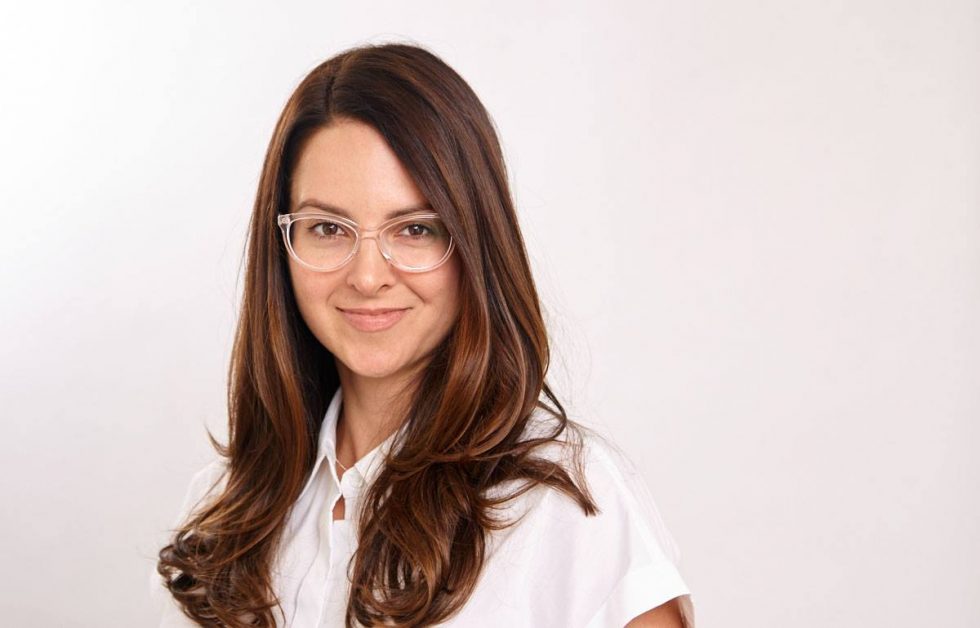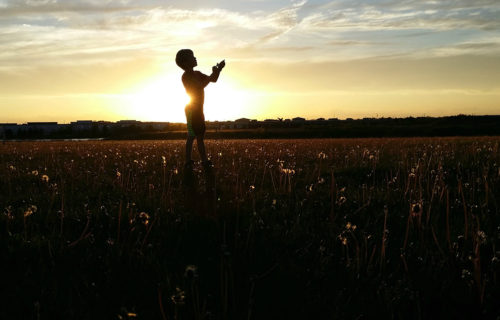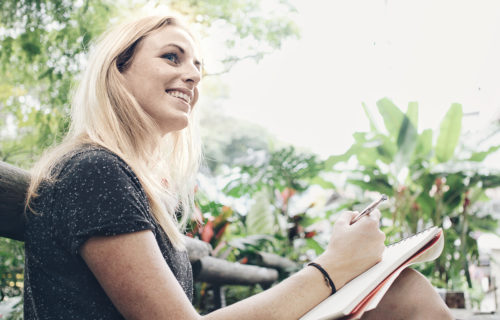
What are Kate Spade’s and Anthony Bourdain’s Tragic Suicides Trying to Teach Us?
Written by Andrea Bijou (38)
Life Challenge of Andrea Bijou
In the wake of Kate Spade and now Anthony Bourdain’s tragic suicides, many of us are contemplating why depression and suicide are so prevalent in our society. Healthcare, though expensive, is readily available and is better than any other time in our history. We have access to healthy food, safe and comfortable homes, and are able to buy most anything our hearts desire on Amazon. Yet according to the Depression and Bipolar Alliance, depression affects approximately 14.8 million Americans in a given year. And did you know depression affects women twice as much as it affects men? I believe there are many biological, environmental, and emotional factors as to why, but here I will discuss my own experiences with depression and how my own spiritual discoveries changed the way I see the darkness that comes from this mental disorder.
I know this dark friend well, I first began to struggle with it when I was 12-years-old—I was being bullied sometimes once, often twice a day by a neighborhood boy. He often told me how ugly I was and why I shouldn't exist. I cried every day for about four years—back then bullying wasn't taken as seriously. The kid was incorrigible, no talks with his parents or teachers would stop his behavior, he was intent to hurt people and I know I wasn't the only one. His messages were clear, I was monstrously ugly and different. I was not worth the air that I breathed and therefore should not be alive. I believed every word, which began my lifelong battle with depression. My first attempt at suicide began with my 12-year-old self-grabbing a knife while my mom chased me to the bathroom. I was fortunate she was there to stop me. Two other kids in my class actually followed through and hung themselves not long after. I am not sure if they were being bullied by this kid, but they lived in my neighborhood, so one can only assume. I truly believe anyone who struggles with depression and suicidal thoughts struggles for a reason. It doesn't happen in a vacuum. We are abused, day in and day out by many things and people who do not know how to act out of love. It could be our parents, peers, strangers, or the media. All I know is, in my most vulnerable, developmental years, I was being told I was worthless, which has negatively affected my mental health since.
When I meet people who struggle with depression, I often wonder who told them the awful things they believe about themselves. Because as adults, these people are intelligent, talented, and beautifully capable people with families and communities. I know they are being asked to inquire deeper, but instead they are desperately looking for a way not to. That is the insidious nature of anguish, it can trap us in the haunting memories or messages that occurred long ago.
For many of us depression is seen as a black fog that grips us, stripping us of joy and clouding our vision so we can only see black. It’s like the nothingness from The NeverEnding Story—it consumes everything wonderful and leaves only an aimless satellite of debris. And yet, that is not what darkness is. We mistakenly see it as malevolent, when its actual purpose is to teach us many things about our individual truth. It is telling us to re-write our scripts, to recall that awful kid who lived one house away and remember he was developmentally challenged—his words were not true, and his mind was not right.
And this is what I know—the dark fog challenges us to talk to ourselves differently. No matter what we have been told or if all we ever knew was abuse, if we are not happy, we need to find our own inner strength so that we can have a real conversation with the darkness.
I had a talk with the black muck that visits me and as it turns out she was about 12-years-old. She was sitting in a pit of black tar when we met, crying. She hated herself. She cursed. She lashed out at anyone who approached her. It was clear she was injured. At first, I just watched her and acknowledged how alone she felt. But I kept on visiting when the blackness asked me to, when she asked me to and eventually I was able to take her hand. At some point I washed the thick muck off of her body. Then I held her and told her how much I loved her, that she was safe now. Today, when I visit my 12-year-old self, she is playing in the Fall leaves out front of my childhood home because that is where I told her to go. The blackness didn’t end there, it came back when I had to face the perversions of my stepfather and grieve my father’s unexpected death. If I didn’t know how to interact with pain, my life would be clouded by the stuff.
One of the best ways that I was able to heal, was to learn visualization and meditation through the teachings of a few talented healers. This valuable skill has helped me not only release pain, but manifest new, more positive opportunities into my life. And once I was able to work through some of my own pain, I saw how many others struggle as well. And when I realized others are struggling, I understood that depression isn’t just happening at an individual level, it’s a societal issue as well. There is an error in how western culture is designed that causes abuse to trickle down to each one of us. Causing massive soul loss and requiring deep soul retrieval, so that our souls won’t stay trapped somewhere harmful when trauma occurs. I believe this to be at the root of much of the dysfunction of the western world.
In 2017, I spent half of my time living and working in Puerto Rico. Life is different on this tiny Caribbean island, for westerners it feels like going back in time about 20 years. Because of the outdated Jones Act and lack of general resources, it is harder to ship goods to Puerto Rico, so less is available and locals are forced to work with what they have. Buildings are run down, but still in use. People rarely use the Internet for anything, not for business, not for connecting, not for searching for goods because often the Internet does not work. Instead, they talk to one another—shocking right? Many Puerto Ricans have a schedule they work around—they get up in the morning, visit a local bakery for coffee and a pastry and while they are there, they see friends and members of their community. This is a very important part of the day—there is networking, information sharing, connecting, and support given and received. Life moves slower because time is taken to care for the needs of the individuals in this community. This is what happens when life is not convenient, people group together in spirit to accomplish their goals.
When I first moved to Puerto Rico I trusted no one, I wondered why everyone happily offered to help me with my tasks. I was certain they wanted something from me. After some time, I began to understand that helping the community is one of the main values for the people of Puerto Rico—it is an exchange that works without money, but instead with compassion and kindness.
I am not saying Puerto Rico is utopia, it is far from it, but it has something many western societies do not have—happiness in spirit. From what I can see, the richer American communities are lacking both the connection to their communities and to their own spirit. We live in clusters of communities in the United States that are isolated from each other and within those groups we rarely interact. And we wonder why we are so unhappy.
I believe there are ways we can change this, and it isn’t as hard as we imagine it to be. We are meant to be in touch with people more, our amazing technological advancements have made life more convenient, but have inadvertently disconnected us from each other. We are meant to interact with our communities daily—social media is no substitute for real life. It was Puerto Rico that taught me how much the group matters and how the design of communities in the United States sets us up for failure.
Healing our own trauma is the first step and when we heal, we will wake up to new ideas of how to restructure our world into a better support network.
If you are close to this darkness, if you are contemplating taking your own life like Kate and Anthony did theirs—please remember you are being asked to make big changes, to heal, to connect with others, and to carry a great light so that you can become a teacher for others. You are not a weak person, you are meant to lead others and yourself through the darkness toward a better day. We need you. You need you. Don’t be afraid to have a conversation with your darkness. You might be surprised by what she might say.
Advise after overcoming this challenge:
I currently still battle depression and suicidal thoughts as an adult. One of the best techniques I have learned to use in critically dangerous moments is "opposite action," which I learned in a 6-month program called Dialectical Behavioral Therapy created by Marsha Linehan, PhD and Professor of Psychology at University of Washington.
The idea is to act opposite of how you feel, even if you do not feel like it. For example, if you are feeling isolated and are feeling too crippled with pain to go meet with people, force yourself to get out anyway. Walk to the market, go to a yoga class, whatever it takes to force yourself out of your negative thinking. Often the small act of getting out of your own isolation can have a profound affect on how you feel. In my experience, I find that I encounter small gestures of kindness from strangers and it completely turns my self-loathing around.
You can learn more at: https://behavioraltech.org/resources/faqs/dialectical-behavior-therapy-dbt/
Tool or technique that helps Andrea Bijou on daily basis:
Recommended Therapies for Depression, Anxiety, and Suicidal Behavior:
Dialectical Behavioral Therapy
Eye Movement Desensitization and Reprocessing Therapy (EMDR)
Visualization Healing and Soul Retrieval
Group and Individual Therapy
Daily Meditation or Mindfulness Practice
Daily Journaling
Exercise
Healthy Diet
What do you think about the story of Andrea Bijou? Please leave a comment below and show some love!
Written by: Andrea Bijou (38)
Gender: Female
From: United States
Favorite quote:
Those who walk in darkness carry a great light—look to their rays of wisdom.
Favorite motivational video:





Great piece of writing, love how you can write these feelings down <3